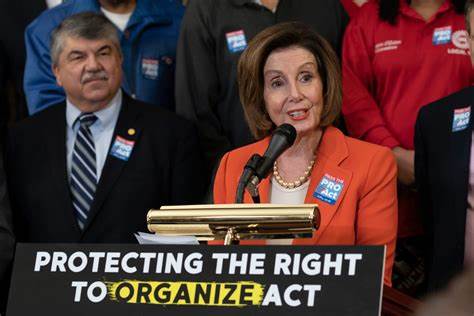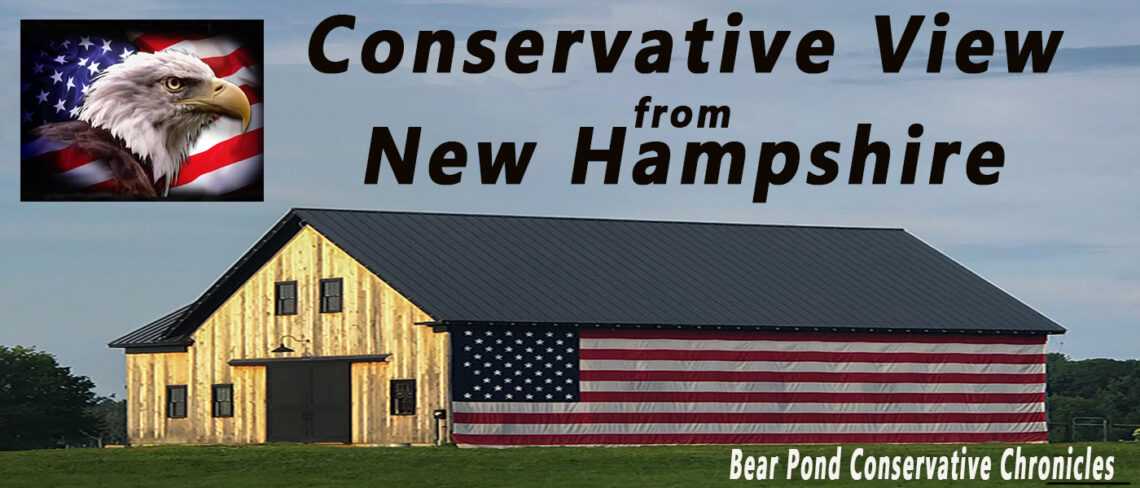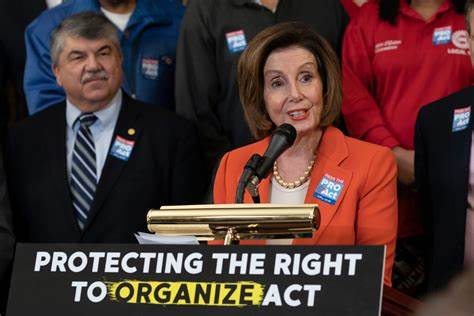
Amazing how she can smile while sticking it to most Americans
March 29, 2021
Nancy Pelosi loves for people to think she is working for them. Working for the little guy. Nancy Pelosi is a con. She has one agenda and that is to place as many Democrats as possible in the House to preserve her place on the throne and to assuage as many special interests with her legislation as she can before anyone really knows what she has slipped by us. Remember the famous line about Obamacare: “we need to pass it before we read it”. The same was said about COVID Relief which was anything but relief. She is a nasty woman with no scruples or morals. Some might say that makes her the perfect politician.
The Protecting the Right to Organize (PRO) Act seems by its name to be innocuous but nay nay….read it and see how many will have jobs, companies and careers destroyed to benefit the Union Bosses. Again, another Progressive Bill to change and / or destroy America and that makes Nancy smile…..sick!
On February 4, 2021, House and Senate Democrats introduced the Protecting the Right to Organize (PRO) Act of 2021. The PRO Act is supported by key members of the Senate’s leadership, including Majority Leader Chuck Schumer. The PRO Act would be the most significant labor law reform in the United States since the World War II-era Taft-Hartley Act and the 1935 Wagner Act, which created the National Labor Relations Board (“NLRB”) and first granted private sector employees the right to form and join labor organizations (“unions”).
The United States House of Representatives passed an earlier version of the PRO Act in February, 2020, but the Senate declined to take further action at the time. While certain major business interests, such as the U.S. Chamber of Commerce, are opposed, President Biden has voiced his support for the PRO Act. At present, it is uncertain whether the PRO Act will become law—and if so, in what form.
If enacted, the PRO Act would result in sweeping changes to the National Labor Relations Act (“NLRA”), including drastically expanded damages, fines, and civil penalties—in some cases imposing personal liability on company officers and directors—as well as expanding pro-employee and union protections. The following is a summary of some of the key areas employers should be aware of under the PRO Act.
End of State Right-to-Work Laws
Currently, the NLRA allows states to ban the payment of mandatory union dues in order to work for an employer. Such states are often referred to “right-to-work” states. In “right-to-work” states, employees are free to choose whether they wish to pay union dues, but the dues payment cannot be a condition of employment. Currently, 27 states, including Wisconsin, have opted for “right-to-work.” The PRO Act would amend the NLRA to invalidate state right-to-work laws. Under the PRO Act, unionized workplaces could require payment of union dues pursuant to “union security clauses” designed to enforce payment of union dues for bargaining and other representational functions. The price for failure to pay is steep; employees who decline to pay—regardless of their right-to-work—are subject to termination under the “union security clause.”
Striking Employees Can No Longer Be Permanently Replaced
Currently, employers have the right to “permanently replace” employees who go on strike in support of their union. During strike situations, employers are often able to obtain replacement workers in order to maintain continuity of operations during the strike. Under the PRO Act, employers will lose the right to permanently replace employees who go on strike during collective bargaining. Instead, employees can walk off the job to obtain increased pay and benefits with the assurance that they can return to work whenever they want. The loss of the right to permanently replace employees is anticipated to give unions a serious advantage in collective bargaining negotiations, especially since the PRO Act will also allow intermittent, partial, and other types of “wildcat” strikes. The PRO Act could take the lockout option away from employers in certain strike situations, further tilting the balance of power towards the union in negotiations
“Secondary” Strikes and Boycotts Will Be Fair Game
In order to maintain economic peace and stability, as well as fairness in labor disputes, the NLRA has long prohibited “secondary” strikes and boycotts against third party employers and contractors. Under these “secondary” rules, unions are required to direct their strikes and economic actions at the “primary” employer whose employees they represent.
The PRO Act would legalize “secondary” strikes and boycotts. This no-holds-barred approach will mean that neutral “innocent bystander” employers, such as vendors, suppliers, and neighboring businesses, who have nothing to do with a particular labor dispute, can be picketed and boycotted by unions in order to exact bargaining demands from employers from completely different companies.
Eroded Distinctions Between Employees, Independent Contractors, and Supervisors
The NLRA has long recognized that only employees, as opposed to managers, supervisors and independent contractors, have the right to form, join, or assist unions. Therefore, the definition of “employee” and “supervisor” under the NLRA has been a critical issue. Unions have long pushed for legislation to expand the definition of “employee” and limit the definition of “supervisor” to bring a greater number of individuals under their sway. Independent contractors are also currently exempt from the scope of the NLRA.
The PRO Act would expand the definition of “employee,” adopting the California “ABC” test to exclude most workers from exempt independent contractor status. The PRO Act would also require employers to act at their peril, even if acting in good-faith; employers found to have mistakenly classified their workers as independent contractors would be in violation of the NLRA.
The PRO Act would also narrow the definition of “supervisor” making it more difficult for an employer to classify its front-line supervisors and management as exempt from union-coverage—for example by removing the “assign” and “responsibly direct” functions from the definition of “supervisor.”
The PRO Act would also expand the concept of a “joint employer” under the NLRA. Currently, employers, such as franchisers, are only liable for the acts of their franchisees or contractors if they both directly control the terms and conditions of employment of the employees. The PRO Act would restore the 2015 Browning-Ferris decision that subjected employers to “joint employer” liability even if the two entities did not directly control the terms and conditions, instead exercising “indirect” control, even if unexercised and only “reserved” in a contract.
Mandatory Arbitration Agreements and Email Systems
The PRO Act contains several provisions that would erode the employer’s right to run the business and maintain the workplace. The Supreme Court’s 2018 Epic Systems decision legalized mandatory arbitration agreements that require employees to submit all employment-related claims, including class and collective actions, to arbitration. The PRO Act would overturn Epic Systems, and invalidate such mandatory arbitration agreements, subjecting employers to defend costly class action litigation in court.
Quickie Elections and Card Checks
The PRO Act would bring back the Obama-era “quickie” election procedures, where pre-election hearings were set for eight days after the union files for recognition with the NLRB. Employers will have only 20 days—at most—to prepare for the pre-election hearing. But the PRO Act goes further, removing employer input in setting how the employee election proceedings will proceed, and granting the NLRB discretion to allow unions to determine the key parameters of the election, such as date(s), method (mail-in versus in person), and location.
Moreover, the PRO Act would expand union rights to “cherry pick” the employees they wish to represent and exclude other employees despite having a community of interest. The PRO Act would reverse the NLRB’s 2017 PCC Structurals, Inc. standard and restore the Obama-era standard, which allows unions wide latitude in excluding “undesired” groups of employees from representation.
When it comes to elections, the NLRB has long recognized that Board-supervised elections, conducted to protect employee free choice, are the preferred method of union certification. However, the PRO Act provides that if a union loses the election, the NLRB may set aside the results of the election and certify the union as the representative on the basis of union authorization cards submitted by employees to the union at any time over the past year.
Conclusions and Take Aways
The foregoing is merely an overview of the changes proposed by the PRO Act; changes which would drastically change the landscape of employer/union relations. The deck will be stacked against employers in NLRB proceedings and in federal court on the passage of the PRO Act.
It is important for employers to re-assess their labor/management relations policy. This begins with its union-free policy and continues to its negotiation strategies. Longer-term contracts may help to blunt the volatility that could result from labor unrest, from which an employer may have few defensive options. Regardless, employers should evaluate their vulnerabilities under the law, if passed, and the steps to be taken now to avoid the appearance of union animus in its policy adoption and administration.
I acknowledge the use of information on the National Law Review website in preparing this summation. This a dangerous bill. We seem to use the word dangerous often but hopefully it will not lose its impact. This bill is potentially devastating to anyone self employed or employed. Just ask the folks in California who are already having to live with the bill that the PRO Act is modeled after. Another example of what happens in California should stay in California.
Categories: Uncategorized

